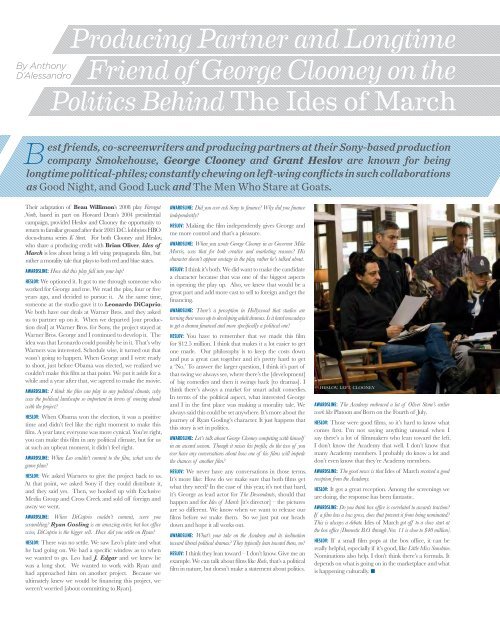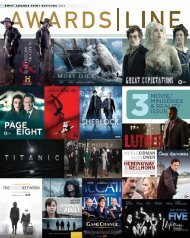THE AWARDS EDITION 2011-2012
THE AWARDS EDITION 2011-2012
THE AWARDS EDITION 2011-2012
- No tags were found...
Create successful ePaper yourself
Turn your PDF publications into a flip-book with our unique Google optimized e-Paper software.
By AnthonyD’AlessandroProducing Partner and LongtimeFriend of George Clooney on thePolitics Behind The Ides of MarchBest friends, co-screenwriters and producing partners at their Sony-based productioncompany Smokehouse, George Clooney and Grant Heslov are known for beinglongtime political-philes; constantly chewing on left-wing conflicts in such collaborationsas Good Night, and Good Luck and The Men Who Stare at Goats.Their adaptation of Beau Willimon’s 2008 play FarragutNorth, based in part on Howard Dean’s 2004 presidentialcampaign, provided Heslov and Clooney the opportunity toreturn to familiar ground after their 2003 D.C. lobbyists HBOdocu-drama series K Street. For both Clooney and Heslov,who share a producing credit with Brian Oliver, Ides ofMarch is less about being a left wing propaganda film, butrather a morality tale that plays to both red and blue states.<strong>AWARDS</strong>LINE: How did this play fall into your lap?HESLOV: We optioned it. It got to me through someone whoworked for George and me. We read the play, four or fiveyears ago, and decided to pursue it. At the same time,someone at the studio gave it to Leonardo DiCaprio.We both have our deals at Warner Bros. and they askedus to partner up on it. When we departed [our productiondeal] at Warner Bros. for Sony, the project stayed atWarner Bros. George and I continued to develop it. Theidea was that Leonardo could possibly be in it. That’s whyWarners was interested. Schedule wise, it turned out thatwasn’t going to happen. When George and I were readyto shoot, just before Obama was elected, we realized wecouldn’t make this film at that point. We put it aside for awhile and a year after that, we agreed to make the movie.<strong>AWARDS</strong>LINE: I think the film can play in any political climate, whywas the political landscape so important in terms of moving aheadwith the project?HESLOV: When Obama won the election, it was a positivetime and didn’t feel like the right moment to make thisfilm. A year later, everyone was more cynical. You’re right,you can make this film in any political climate, but for usat such an upbeat moment, it didn’t feel right.<strong>AWARDS</strong>LINE: When Leo couldn’t commit to the film, what was thegame plan?HESLOV: We asked Warners to give the project back to us.At that point, we asked Sony if they could distribute it,and they said yes. Then, we hooked up with ExclusiveMedia Group and Cross Creek and sold off foreign andaway we went.<strong>AWARDS</strong>LINE: When DiCaprio couldn’t commit, were youscrambling? Ryan Gosling is an amazing actor, but box officewise, DiCaprio is the bigger sell. How did you settle on Ryan?HESLOV: There was no settle. We saw Leo’s plate and whathe had going on. We had a specific window as to whenwe wanted to go. Leo had J. Edgar and we knew hewas a long shot. We wanted to work with Ryan andhad approached him on another project. Because weultimately knew we would be financing this project, weweren’t worried [about committing to Ryan].<strong>AWARDS</strong>LINE: Did you ever ask Sony to finance? Why did you financeindependently?HESLOV: Making the film independently gives George andme more control and that’s a pleasure.<strong>AWARDS</strong>LINE: When you wrote George Clooney in as Governor MikeMorris, was that for both creative and marketing reasons? Hischaracter doesn’t appear onstage in the play, rather he’s talked about.HESLOV: I think it’s both. We did want to make the candidatea character because that was one of the biggest aspectsin opening the play up. Also, we knew that would be agreat part and add more cast to sell to foreign and get thefinancing.<strong>AWARDS</strong>LINE: There’s a perception in Hollywood that studios areturning their noses up to developing adult dramas. Is it hard nowadaysto get a drama financed and more specifically a political one?HESLOV: You have to remember that we made this filmfor $12.5 million. I think that makes it a lot easier to getone made. Our philosophy is to keep the costs downand put a great cast together and it’s pretty hard to geta ‘No.’ To answer the larger question, I think it’s part ofthat swing we always see, where there’s the [development]of big comedies and then it swings back [to dramas]. Ithink there’s always a market for smart adult comedies.In terms of the political aspect, what interested Georgeand I in the first place was making a morality tale. Wealways said this could be set anywhere. It’s more about thejourney of Ryan Gosling’s character. It just happens thatthis story is set in politics.<strong>AWARDS</strong>LINE: Let’s talk about George Clooney competing with himselfin an award season. Though it raises his profile, do the two of youever have any conversations about how one of his films will impedethe chances of another film?HESLOV: We never have any conversations in those terms.It’s more like: How do we make sure that both films getwhat they need? In the case of this year, it’s not that hard,it’s George as lead actor for The Descendants, should thathappen and for Ides of March [it’s director] – the picturesare so different. We know when we want to release ourfilms before we make them. So we just put our headsdown and hope it all works out.<strong>AWARDS</strong>LINE: What’s your take on the Academy and its inclinationtoward liberal political dramas? They typically lean toward them, no?HESLOV: I think they lean toward – I don’t know. Give me anexample. We can talk about films like Reds, that’s a politicalfilm in nature, but doesn’t make a statement about politics.heslov, left, CLOOney<strong>AWARDS</strong>LINE: The Academy embraced a lot of Oliver Stone’s earlierwork like Platoon and Born on the Fourth of July.HESLOV: Those were good films, so it’s hard to know whatcomes first. I’m not saying anything unusual when Isay there’s a lot of filmmakers who lean toward the left.I don’t know the Academy that well. I don’t know thatmany Academy members. I probably do know a lot anddon’t even know that they’re Academy members.<strong>AWARDS</strong>LINE: The good news is that Ides of March received a goodreception from the Academy.HESLOV: It got a great reception. Among the screenings weare doing, the response has been fantastic.<strong>AWARDS</strong>LINE: Do you think box office is correlated to awards traction?If a film has a low gross, does that prevent it from being nominated?This is always a debate. Ides of March got off to a slow start atthe box office [Domestic B.O. through Nov. 11 is close to $40 million].HESLOV: If a small film pops at the box office, it can bereally helpful, especially if it’s good, like Little Miss Sunshine.Nominations also help. I don’t think there’s a formula. Itdepends on what is going on in the marketplace and whatis happening culturally. •











